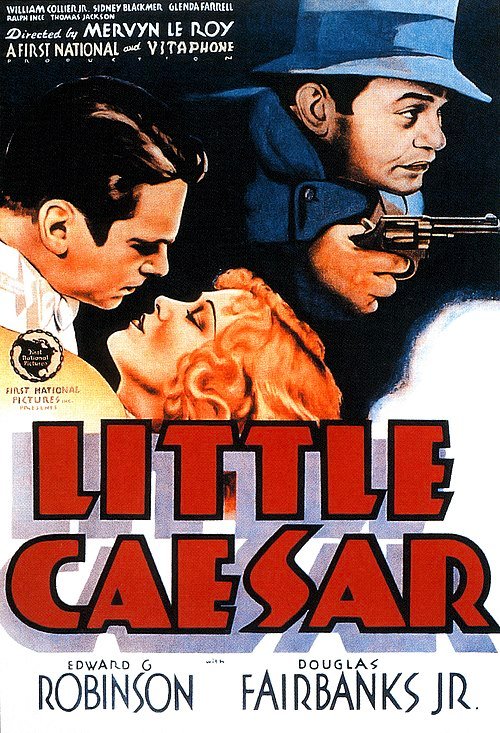
Little Caesar
USA, 1931
Director: Mervyn Le Roy
Screenplay: Francis Edward Faragoh, Robert N. Lee
Cast:
Edward G. Robinson
Douglas Fairbanks Jr.
Glenda Farrell
Genre: Gangsters
Plot
Caesar Enrico Bandello, called Rico, is an ambitious Italian-American thug in search of fortune. He arrives in Chicago with his friend Joe Massara, who himself is interested in show business and dancing. Rich, tough and unscrupulous, he contacts the mob boss Sam Vettori, and puts himself at his service. He becomes a member of the gang, and is nicknamed “Little Caesar” (at first in a mocking tone, but soon they begin to take him seriously)…
Joe, in turn, starts working at the Palermo cabaret. There he meets the attractive Olga, also employed as a dancer at the cabaret. The two begin a romance. Joe is not interested in illegal activities, but Rico pressures him to take part in a promising heist: they plan to rob none other than the Palermo cabaret itself. Rico, on behalf of Vettori and his gang, intends to use his friend, who, working there, has inside information.
The heist is set for New Year’s Eve. Rico bursts into the crowded room where the party is taking place with his face uncovered. Someone tries to get in his way and Rico fries him with a bullet. The gang makes off with a good haul.
Once in Vettori’s lair, he berates Rico for killing someone, as the hit was supposed to be bloodless. What’s worse, the dead man was an important policeman, Commissioner McClure. The law enforcement officers are particularly interested in investigating the case and discovering the culprit. They suspect Vettori’s gang, because they have an exhaustive description of the main offender, and they know that the appearance of one of his men matches that description.
Vettori berates Rico for his recklessness, while the young gangster accuses his boss of being a softie. He confronts him and seeks to take control of the organization. Meanwhile, Joe feels guilty, as he considers himself an accomplice to the murder.
Rico will have to watch out for both the police and a rival gang that disputes his hegemony in the Chicago underworld.
And also with the members of his own band: Tony, who after talking to his mother is remorseful for his actions, sets out to go to confession in church, revealing his crimes. And Joe, the friend with whom he arrived in Chicago, also becomes more and more estranged from the group. Rico suspects he could become a danger. He also believes that Olga’s influence over his friend has contributed to Joe’s alienation from the gang, and he is prepared to take drastic measures…
The petulant thug surrounds himself with a court of sycophants and manages to gradually displace the competition. His power seems unstoppable. But behind his dazzling rise, an even more dizzying plummet is looming…

Comment
This classic gangster film stars Edward G. Robinson, one of the great icons of the genre in the 1930s along with Paul Muni and James Cagney.
The physical resemblance between Robinson and Al Capone is striking. But Robinson was not of Italian origin like „Scarface Al“, but Jewish. His real name was Emanuel Goldenberg, and his parents had emigrated to New York from Romania.
The story is based on the homonymous novel by author William R. Barnett.

There is a scene in which, during the party, photographers from a newspaper arrive at the Palermo club. Rico poses proudly in front of the cameras, while another member of the gang, more astute and cautious, prefers to avoid drawing attention to himself. That scene highlights the parallelism that more than 50 years later that situation in the film and all the great contrast that it implies would have in a case of real-life mobsters: John Gotti, head of the Gambino family, had a narcissistic character very similar to this fictional Little Caesar and he also liked to be the center of attention (which in many ways contributed to his downfall). The other mobster who avoids photos and withdraws when journalists come is reminiscent of Vincent Gigante, taciturn and underhanded boss of the Genovese, who unlike Gotti preferred to keep a low profile.
John Gotti is quite reminiscent of the cocky and boastful character here played by Edward G. Robinson. And the future leader of the Gambino family was not even born when this film was shot.
The film was directed by Mervin Le Roy, who in 1951 made the classic “Quo vadis”, and in 1956 the also highly recommended “The bad seed”, a film of suspense and psychological terror.
Get Little Caesar HERE!
(This is an affiliate link. I may earn a commission if you purchase through these link, at no extra cost to you. As an Amazon Associate, I earn from qualifying purchases.)
